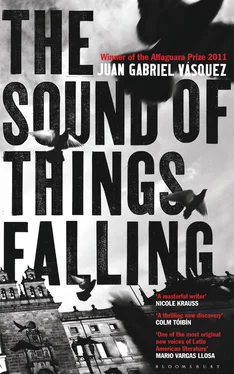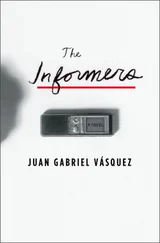Leticia was born one August morning. We had spent the night at the clinic, preparing for the surgery, and in the atmosphere of the room — Aura in the bed, me on the companion’s sofa — there was a sort of macabre inversion of another room, of another time. When the nurses came to take her, Aura was already giddy with anaesthetic, and the last thing she said to me was, ‘I think it was O. J. Simpson’s glove.’ I would have liked to hold her hand, not to have crutches and be able to hold her hand, and I told her so, but she was already unconscious. I went along beside her down corridors and in lifts while the nurses told me to relax, Papá, that everything was going to be fine, and I wondered what right these women had to call me Papá, much less to give me their opinion on the future. Later, in front of the huge swinging doors of the operating theatre, they showed me to a waiting room that was more like a way station with three chairs and a table with magazines on it. I left my crutches leaning in a corner, by the photograph or rather the poster of a pink baby smiling toothlessly, hugging a giant sunflower, against a blue sky in the background. I opened an old magazine, tried to distract myself with a crossword puzzle: Threshing place. Brother of Onan. People slow to act, especially by pretence. But I could only think of the woman who was sleeping inside there while a scalpel opened her skin and her flesh, of the gloved hands that were going to reach inside her body and take my daughter out. May those hands be careful ones, I thought, let them move with dexterity, and not touch what they shouldn’t touch. Let them not hurt you, Leticia, and don’t be scared, because there’s nothing to fear. I was on my feet when a young man came out and, without taking his mask off, told me, ‘Both your princesses are perfectly fine.’ I didn’t know when I had stood up, and my leg had started to ache, so I sat back down. I held my hands to my face out of shame, nobody likes to make a show of his tears. People slow to act , I thought, especially by pretence. And later, when I saw Leticia in a sort of bluish, translucent pool, when I saw her finally asleep and well wrapped up in little white blankets that even from a distance looked warm, I thought again of that ridiculous phrase. I concentrated on Leticia. From too far away I saw her eyes without lashes, I saw the tiniest mouth I’d ever seen, and regretted that they’d put her down with her hands hidden, because nothing seemed more urgent to me at that moment than seeing my daughter’s hands. I knew I’d never love anyone like I loved Leticia in that instant, that nobody would ever be what, there and then, that new arrival, that complete stranger was to me.
I did not set foot on 14th Street again, much less in the billiard club (I stopped playing entirely: standing up for too long exacerbated the pain in my leg to the point of making it unbearable). So I lost one part of the city; or, to put it a better way, a part of my city was stolen from me. I imagined a city in which the streets, the pavements gradually closed themselves off to us, like the rooms of the house in Julio Cortázar’s story, until eventually expelling us. ‘We were fine, and little by little we began to live unthinkingly,’ says the brother in that story after a mysterious presence has taken over another part of the house. And he adds, ‘You can live without thinking.’ It’s true: you can. After 14th Street was stolen from me — and after months of physiotherapy, of enduring light-headedness and my stomach destroyed by medication — I began to despise the city, to fear it, to feel threatened by it. The world seemed to me a closed place, or my life a walled-in life; the doctor talked to me about my fear of going out on the street, he proffered the word agoraphobia as if it were a delicate object that mustn’t be allowed to fall, and it was hard for me to explain that it was just the opposite, a violent claustrophobia was what was tormenting me. One day, during a session I don’t remember anything else about, that doctor recommended I try a kind of personal therapy that, according to him, had worked well for several of his patients.
‘Do you keep a diary, Antonio?’
I said no, that diaries had always seemed ridiculous to me, a vanity or an anachronism: the fiction that our life matters.
He replied, ‘Well start one. I’m not suggesting a diary-diary, but a notebook to ask yourself questions.’
‘Questions,’ I repeated. ‘Like what?’
‘Like, for example: what dangers are real in Bogotá? What are the chances of what happened to you happening again? If you want I could pass you some statistics. Questions, Antonio, questions. Why what happened to you happened to you, and whose fault it was, if it was yours or not. If this would have happened to you in another country. If this would have happened to you in another time. If these questions have any pertinence. It’s important to distinguish the pertinent questions from the ones that are not, Antonio, and one way to do that is to put them down in writing. When you’ve decided which ones are pertinent and which are silly attempts to find an explanation for what can’t be explained, ask yourself other questions: how to get better, how to forget without kidding yourself, how to go back to having a life, to be good to the people who love you. What to do to not be afraid, or to have a reasonable amount of fear, like everyone has. What to do to carry on, Antonio. Lots of them will be things that have occurred to you before, sure, but a person sees the questions on paper and it’s quite different. A diary. Keep one for the next two weeks and then we’ll talk.’
It seemed an inane recommendation to me, more suited to a self-help book than to a professional with grey hair at his temples, headed notepaper on his desk and diplomas in several languages on his wall. I didn’t say so to him, of course, nor was it necessary, because I soon saw him stand up and walk over to his bookshelves (the books leather-bound and homogeneous, the family photos, a childish drawing framed and signed illegibly). ‘You’re not going to do any such thing, I can see that,’ he said as he opened a drawer. ‘You think all these things I’m saying are stupid. Well, I suppose they might be. But do me a favour, take this.’ He pulled a spiral notebook out of the drawer, like the ones I’d used in college, with those ridiculous covers that looked like denim; he tore four, five or six pages out of the front and looked at the last page, to make sure there weren’t any notes there; he handed it to me, or rather he put it on the desk, in front of me. I picked it up and, for something to do, opened it and flipped through it as if it were a novel. The paper in the notebook was squared: I always hated grid-ruled notebooks. On the first page I could make out the pressure of the writing from the torn-out page, those phantom words. A date, an underlined word, the letter Y. ‘Thanks,’ I said, and left. That very night, in spite of my initial scepticism at the strategy, I locked the door to my room (an absurd security measure), opened the notebook and wrote: Dear diary . My sarcasm fell into the void. I turned the page and tried to begin:
What
Why
But that was it. And so, with my pen in mid-air and my gaze sunk in the isolated words, I remained for a few long seconds. Aura, who had been suffering from a slight but annoying cold all week, was sleeping with her mouth open. I looked at her, tried to make a sketch of her features and failed. I ran through a mental inventory of the next day’s obligations, which included a vaccination for Leticia, who was sleeping quietly beside us in her cot. Then I closed the notebook, put it away in the nightstand and turned off the light.
Outside, in the depths of the night, a dog barked.
Читать дальше












